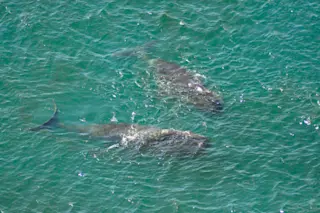Climate change is impacting bowhead whales and the Arctic food web, and it stinks — literally.
New research from the Woods Hole Oceanographic Institution (WHOI) looked at the fecal matter of bowhead whales and found something alarming. Within the fecal samples were higher concentrations of algal toxins, indicating a major threat to the Arctic food web.
These toxins are not only a threat to the marine organisms that live in this region, but also the coastal communities in Alaska that rely on them.
The new study, published in Nature, analyzes the risks these toxins pose to animals like clams, fish, and even whales, which some Alaska Native communities harvest for subsistence purposes.
“These are new risks that were previously unknown,” said Kathi Lefebvre, a research scientist at NOAA Fisheries’ Northwest Fisheries Science Center in Seattle and lead author of the new study, in a press release. “The people in remote ...















